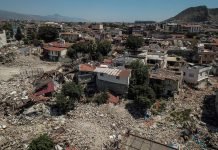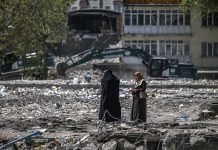Victims of devastating earthquakes that struck Turkey’s southern provinces in early February are having problems accessing essential health services and basic medicine, the TR724 news website reported on Wednesday.
According to TR724, earthquake survivors who are suffering from cancer, asthma, COPD (chronic obstructive pulmonary disease), hypertension or diabetes are having difficulty obtaining appropriate medication and necessary health services.
A 7.8-magnitude earthquake that struck near the Turkish city of Gaziantep – home to around 2 million people and on the border with Syria – as people were sleeping on February 6 was followed by dozens of aftershocks, including a 7.5-magnitude temblor that jolted the region in the middle of search and rescue efforts the same day.
Some key sectors of the emergency and recovery response in Turkey remain dangerously underfunded, including health, the International Organization for Migration (IOM) said earlier this month.
According to the IOM, an estimated 500 health care workers died in the earthquakes, hundreds have been injured and thousands left without a place to call home.
UN agencies have repeatedly called on the international community to increase its efforts to ensure aid keeps reaching the millions of people affected by the major earthquakes.
According to relief organizations, the impact of the earthquakes will be felt for months and years to come.
Around 2.7 million people remain internally displaced in the country. Shelter, water sanitation facilities, healthcare, protection (including mental health and psychosocial support) and continuity of learning remain priority needs, according to UNICEF Turkey.
The damage in Turkey alone could amount to over $100 billion, the UN said and launched a $1 billion funding appeal to support millions of people in Turkey.















